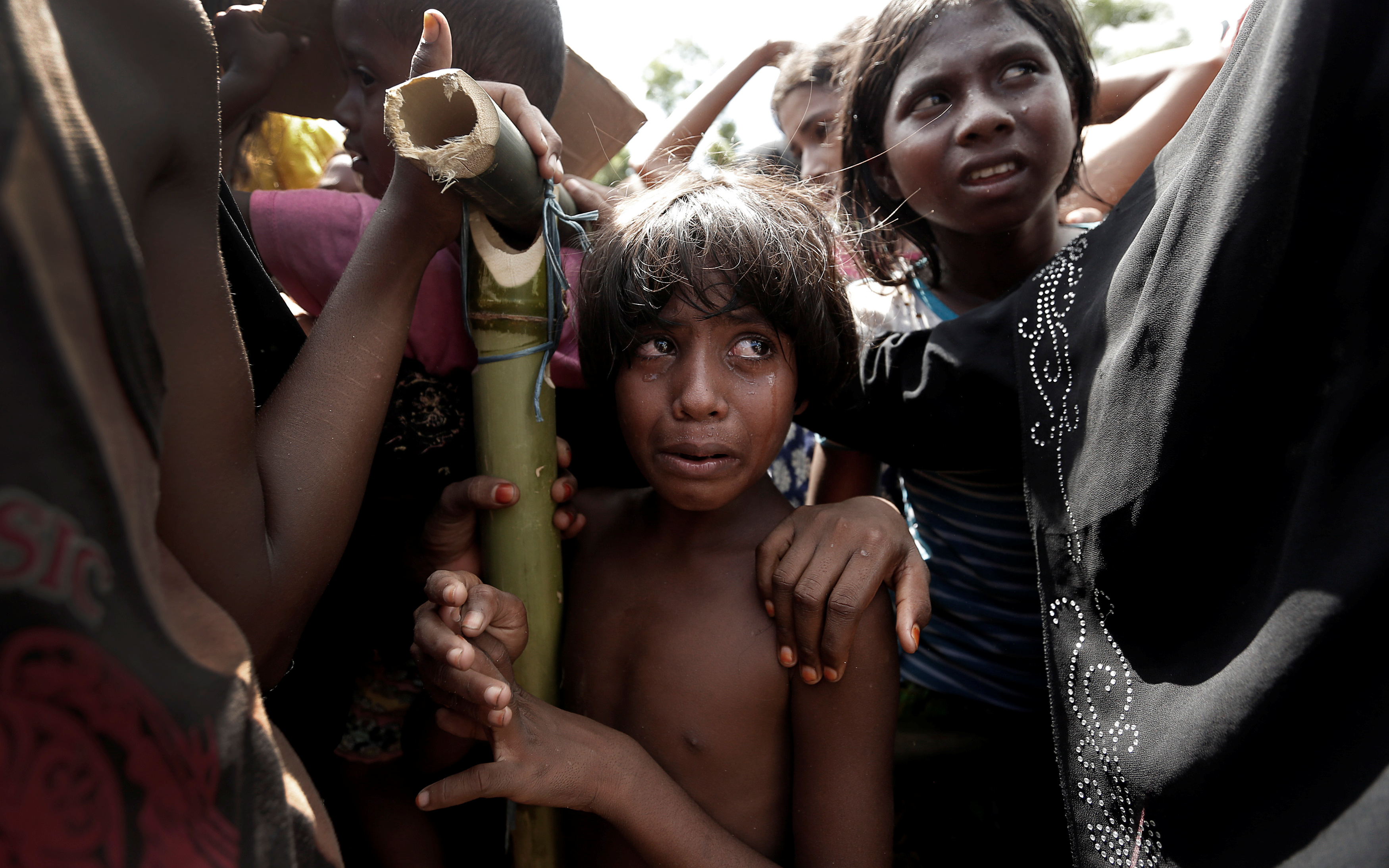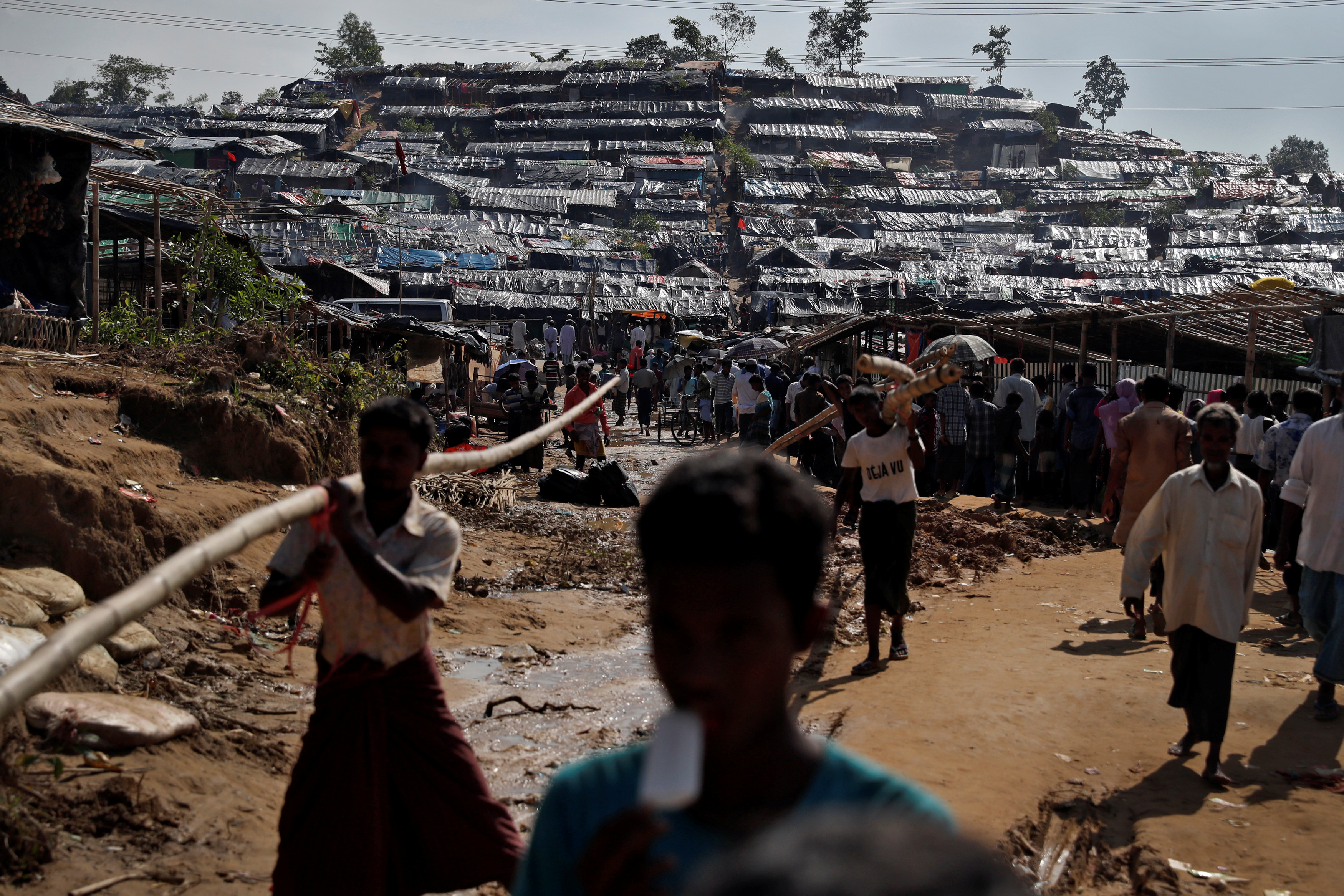
By Tommy Wilkes and Michelle Nichols
COX’S BAZAR, Bangladesh/UNITED NATIONS (Reuters) – More than 60 Rohingya Muslim refugees from Myanmar are believed to have drowned when their boat capsized, the latest victims in what the United Nations says is the world’s fastest-developing refugee emergency.
The refugees drowned in heavy seas off Bangladesh late on Thursday, part of a new surge of people fleeing a Myanmar military campaign that began on Aug. 25 and has triggered an exodus of some 502,000 people.
International anger over the crisis is growing.
In New York, U.S. Ambassador to the United Nations Nikki Haley called on countries to suspend providing weapons to Myanmar over the violence.
It was the first time the United States had called for punishment of Myanmar’s military, but she stopped short of threatening to reimpose U.S. sanctions which were suspended under the Obama administration.
Buddhist-majority Myanmar rejects accusations of ethnic cleansing and crimes against humanity and has denounced rights abuses.
Its military launched a big offensive in response to coordinated attacks on the security forces by Rohingya insurgents in the north of Rakhine state on Aug. 25.
U.N. Secretary-General Antonio Guterres told the Security Council the violence had spiraled into the “world’s fastest-developing refugee emergency, a humanitarian and human rights nightmare”.
Colonel Anisul Haque, head of the Bangladeshi border guards in the town of Teknaf, told Reuters more refugees had arrived over the past day or two after the number had seemed to be tailing off, with about 1,000 landing at the main entry point on the coast on Thursday.
The refugee boat capsized in driving rain and high seas as darkness fell.
An official with the International Organization for Migration said 23 people were confirmed dead and 40 were missing. Seventeen survived.
“We’re now saying 40 missing, which suggests the total fatality rate will be in the range of 63,” the official, Joe Millman, told a news briefing in Geneva.
One survivor, Abdul Kalam, 55, said his wife, two daughters and a grandson were among the dead, who were buried at tearful funerals on Friday.
Kalam said armed Buddhists came to his village about a week ago and took livestock and food. He said villagers were summoned to a military office and told there were no such people as Rohingya in Myanmar.
After that he decided to leave and headed to the coast with his family, avoiding military camps on the way.
A spokesman for the U.N. refugee agency said a fifth of new arrivals were suffering from acute malnutrition.
The Bangladeshi Red Crescent said its clinics were treating increasing numbers of people with acute diarrhea. The World Health Organization has said one of the diseases it is particularly worried about is cholera.
“We’re seeing the absolute perfect breeding ground for a major health crisis,” said Unni Krishnan, director of Save the Children’s Emergency Health Unit.
‘BRUTAL CAMPAIGN’
In a ramping up of the pressure on Myanmar, also known as Burma, Haley echoed U.N. accusations that the displacement of hundreds of thousands of people in Rakhine state was ethnic cleansing.
“We cannot be afraid to call the actions of the Burmese authorities what they appear to be – a brutal, sustained campaign to cleanse the country of an ethnic minority,” Haley told the U.N. Security Council.
The United States said earlier the army response to the insurgent attacks was “disproportionate” and the crisis raised questions about Myanmar’s transition, under the leadership of Nobel laureate Aung San Suu Kyi, after decades of military rule.
Suu Kyi has no power over the generals under a military-drafted constitution. She has nevertheless drawn scathing criticism from around the world for not stopping the violence.
The public in Myanmar, where Buddhist nationalism has surged over recent years, largely supports the offensive against the insurgents.
Haley said the military must respect rights and fundamental freedoms, and those who had been accused of abuses should be removed from command and prosecuted.
“And any country that is currently providing weapons to the Burmese military should suspend these activities until sufficient accountability measures are in place,” she said.
There was no ethnic cleansing or genocide in Myanmar, its national security adviser, Thaung Tun, said at the United Nations, adding that Myanmar had invited Guterres to visit.
China and Russia, which have veto powers in the Security Council, expressed support for Myanmar.
The U.N. Human Rights Council extended the mandate of a Myanmar fact-finding mission by six months, until September 2018, over the objections of Myanmar, China and the Philippines.
Myanmar’s representative said the mission was “not helpful, was not in line with the situation on the ground and would do no good to finding a solution to Rakhine issues”.
Myanmar says it will not grant visas to mission investigators.
(Additional reporting by Serajul Quadir in DHAKA, Nurul Islam, Rahul Bhatia in COX’S BAZAR, Stephanie Ulmer-Nebehay and Tom Miles in GENEVA; Writing by Robert Birsel; Editing by Clarence Fernandez and Nick Macfie)











